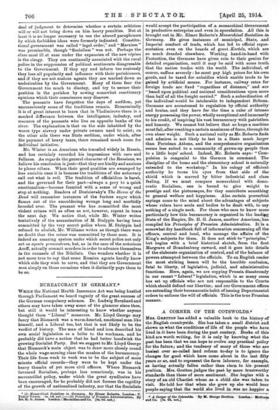BUREAUCRACY IN GERMANY.* Wawa the National Health Insurance Act was
being hustled through Parliament we beard vaguely of the great success of the German compulsory schemes. Dr. Ludwig Bernhard and others may have taken away some of the glamour since then, but still it would be interesting to know whether anyone thought them "Liberal" measures. Mr. Lloyd George may fancy that Bismarck was a warm-hearted, emotional man like himself, and a Liberal too, but that is not likely to be the verdict of history. The man of blood and iron described his own social legislation as a bribe to the workman, and he probably did have a notion that he had better hoodwink the growing Socialist Party. But we suggest to Mr. Lloyd George that Bismarck's main object was to draw more closely round the whole wage-earning class the meshes of the bureaucracy. Their life from week to week was to be the subject of more minute official records—they were to be kept under the heavy thumbs of yet more civil officers. Where Bismarck favoured Socialism, perhaps less consciously, was in his mercantilist policy, under which the great syndicates have been encouraged, for he probably did not foresee the rapidity of the growth of nationalized industry, nor that the Socialists
• ,(1) Monarchical Sootatism in Germany,. By Elmer Roberta. London: T.
Reallor UnwIn. ,4. not.]—(2) Prinmples of Prussian Administration. By Sts: S. 0. Jame. Landon and Co. [4e. 6d. net, j would accept the participation of ,a monarchical Government in productive enterprise and even in speculation. All this is brought out in Mr. Elmer Roberts's Monarchical Socialism in Germany. He gives instances of municipal, State, and Imperial conduct of trade, which has led to official repre- sentation even on the boards of great II-allele, which are so much dreaded elsewhere. Working hand-in-hand with Protection, the Germans have given rein to their genius for detailed organization, until it may be said with some truth that the nation trades with the world. The individual, of course, Buffets severely : he must pay high prices for his own, ,goods, and be taxed, for subsidies which enable trade to be gained by artificial means. For instance, railway rates fqr foreign trade are fixed "regardless of distance," and are " based •upon political and national considerations upon more than half of all the freight carried." Such a subordination of the individual.would be intolerable to independent Britons. Germansare accustomed to regulation by official authority and brains, and they have for the time a ruler of intense energy possessing the power, wholly exceptional and immensely to his credit, of inspiring his vast bureaucracy with patriotism and honesty. We cannot but believe that so.huge a machine must fail, after reaching a certain maximum of force, through its own sheer weight. Such a national unity as Mr. Roberts finds and admires is not likely to last in a State much larger than Periolean Athens, and the comprehensive,organization seems lees suited .to a community of grown-up people than to a little boys' school. Indeed, Mr. Roberta says: " Com- pulsion is congenial to the German in command. The discipline of the home and the elementary school is naturally extended Ito the workshop." In his eulogy a efficient authority he turns his eyes from that _side of the shield which is marred by bitter industrial and class feeling. If we must compare monarchical with demo- cratic Socialism, one is bound to -give weight to prestige and the picturesque, for they contribute something' to general welfare and happiness. Also certain proverbial sayings come to the mind about the-advantages of subjects whose rulers have souls and bodies to be dealt with, to say nothing of a single neck. For those who care to know more particularly how this bureaucracy is organized in the leading State of the Empire, Dr. H. G. James, another American, has compiled his Principles of Prussian Administration. It is a somewhat dry handbook full of information concerning all the officers, central and local, who managO the affairs of the king's subjects for them. It does not stick to "principles,' but begins with ,a brief historical sketch, from the first Margrave of Brandenburg onward, and it goes into details of the elaborate organization of control, and of the balance of powers attempted between the officials. To an English reader the most striking lesson -will be the horrible confusion, fatal to liberty, of legislative, judicial, and administrative functions. Here, again, we are copying Prussia disastrously in our recent "- Liberal" legislation, which in so many eases has set up officials who- are not responsible to the Courts which should defend our liberties; and our Government offices are extending theirbureancratio habit of issuing Departmental orders to enforce the will of officials. This is the true Prussian manner.


























































 Previous page
Previous page